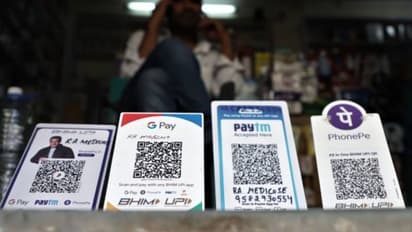UPI transactions leap 57 pc in FY24; PhonePe, Google Pay command 86 pc market share

Synopsis
In FY24, UPI transactions grew by 57%, with PhonePe and Google Pay dominating 86% of the market, according to the Boston Consulting Group. Digital payments saw a notable shift, with credit card transactions doubling over the past three years, while debit card transactions fell by 43% year-on-year.
The UPI transactions segment witnessed robust growth in FY24, with a 57 percent increase from the previous year. PhonePe and Google Pay solidified their dominance, jointly accounting for 86% of the market, according to the Boston Consulting Group (BCG) Banking sector roundup for FY24. A significant trend emerged in digital payments, with credit card transactions experiencing a remarkable 100% growth over the past three years. Meanwhile, debit card transactions saw a notable decline of 43% year-on-year (YoY). India's banking sector demonstrated robust health in FY24 with credit growth accelerating by 15 percent and deposit growth rising by 13 percent.
The banking sector achieved a milestone in FY24, with its collective net profit surpassing Rs 3 lakh crore for the first time. Notably, all bank categories reported a return on assets (ROA) of over 1%, highlighting the sector's impressive profitability.
Private banks reported a 25 percent year-on-year increase in profits, whereas public sector banks (PSBs) recorded a 34 percent rise in net profit.
India's economy outpaced expectations in FY24, achieving an impressive 8.2 percent year-on-year growth rate. Looking ahead, forecasts suggest a robust expansion of 6.2-7 percent in FY25. This strong economic performance prompted S&P Global Ratings to revise India's sovereign rating outlook from stable to positive, driven by enhanced growth prospects and more effective government spending.
Although the financial sector posted strong results, its efficiency ratio took a hit, with the cost-to-income ratio (CIR) deteriorating by 206 basis points to 49.6 percent. Public sector banks (PSBs) saw their CIR rise to 52 percent, up from 50 percent in the previous year, while private banks experienced a modest increase to 47 percent from 46 percent in FY23.
Find the latest Technology News covering Smartphone Updates, AI (Artificial Intelligence) breakthroughs, and innovations in space exploration. Stay updated on gadgets, apps, and digital trends with expert reviews, product comparisons, and tech insights. Download the Asianet News Official App from the Android Play Store and iPhone App Store for everything shaping the future of technology.